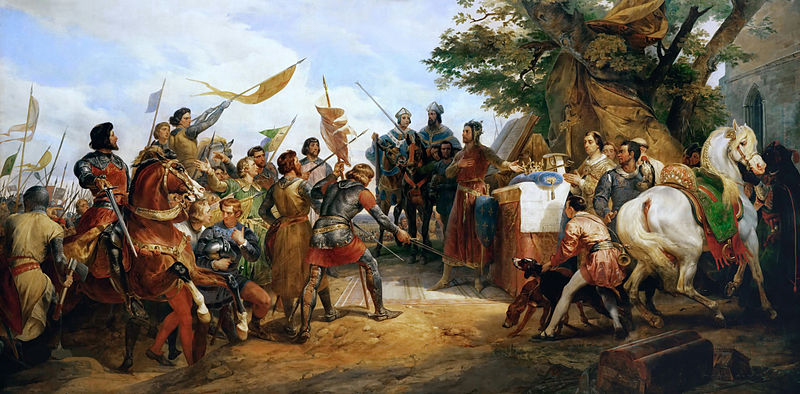While "One-Hour Wargames" is written for simple, quick-playing, 2-person games [that also do well solo] sometimes we've extra people show up or just want to throw a big battle - perhaps an historical one - or just a large throw-down with all the figures we and everyone we know has! Or perhaps its a culminating campaign game where all the forces and players are going to be present [a wargamers dream!].
Yet, often these games become disasters. They get bogged down in poor planning, logistical problems, or lopsided encounters where a couple of clever people trash the other side and the game either ends before everyone gets playing or drags on forever while some people have already had their command terminated. What to do?
"Gentlemen, that covers the rules overview, here are your dice and QRS"
"I think the knights should enter the table here - no wait! over here, I think"
"Are your troops even in the battle yet?" "No, I think I'll eat lunch while I wait"
"Hey, what's the modifier for skirmishers hitting a flank?" "CAN skirmishers charge??"
"Sire, what are these figures over here - reinforcements or dead?" "Pass the pretzels."

Early big battle wargame being played with less than total success...
From: https://en.wikipedia.org/wiki/Battle_of_Bouvines
After lots of years at the gaming table, I can assure you I have participated in or worse - planned - a number of less than excellent large games. But, it is worth trying to throw a bigger event periodically as it galvanizes the group, gives everyone a goal to participate in and of course helps us to hurry up and finish those figures that need just a little more work!
The "One-Hour Wargames" approach can work for large battles as well as small ones, I believe. In fact, it is probably better suited to a large multi-pplayer game than the vast majority of more complicated yet difficult to understand rule sets that are out there. I think part of the key is that it is a scenario-driven game system rather than a rules-driven game system.
My experience of about 40 plays of the various scenarios with various of the rules sets, modified and unmodified - RAW - is that player understanding of the victory conditions and their decisions towards them reward the better player with victory 3-4 out of 5 games. It is still possible to roll your way to victory - or defeat - but over a few games the better players win solidly in the majority of plays. And knowing the rules helps, but is not the determining factor once you've tried them out just a couple of times.
So to my mind, since two people can play out this battle in an hour or less...
There's no reason why we can't put together several of these...
...and make a game for six people to play in about an hour!
Above, scenarios 4, 8 & 10 mega-battle. Note that the #10 map is reversed.
So, I'm planning for 5-8 people to attend the game, but don't know who specifically. With 18 Units a side, 6 / scenario, and me playing or not playing, I can GM for 5-6 easy, and split a couple of commands [while I don't play] with a novice player and an experienced player.
The overall scenario is that the Blue side [bottom] is trying to seize a number of terrain objectives, specifically two hills that dominate roads [left and center] and a tight gap between an impassible hill and a large wood [at right]. If they succeed in two of the three scenarios, they will win overall, as the final enemy force will be forced to retreat with their allies. If the two hills and the pass are controlled, then the defenders will be successfully besieged.
No force is allowed to help another force win their scenario unless they totally wipe out their opponent. So it is most likely that there will be three totally separate games being played alongside one another, except that they will stay on the same turn sequence [which is not necessarily mandatory, for player who all know how to play the game themselves]. I'm hoping that there'll be time enough to play twice in one evening.
For an early medieval game, this battle has good historical feel. Each of the commands is full of warlords who don't necessarily trust each other much more than the opposing warlords. I want the players to play three full games, alongside one another, but without intruding into each other's games.
For time, I'm budgeting about 30 minutes for everyone to settle in and get an overview of the rules, 90 minutes to play the first time, and under 60 minutes to play a second time, altho depending on who shows up they may very well play in 60 and 45 minutes each time, since the rules are so straight forward.
I won't be using a number of optional rules I have, few of which add much time to the game, but they all add a little more complexity. I want the players to concentrate on making decisions that will win the scenario, each side of which has about three important decisions to make, creating a matrix of about nine possible ways for the game to develop. That's plenty of playing, so I'm glad that the scenarios are only about an hour each!
Tune in for the results later...




No comments:
Post a Comment
Thanks for your comment! t will be posted after it's moderated.